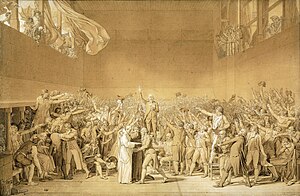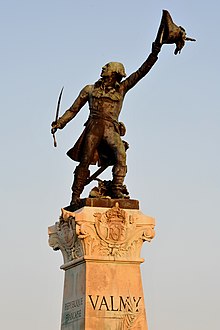1765 - Tracts upon the Popery Code by Edmund Burke calls for lifting of penal code.
1789 June - Formation of the Whig Club by Grattan, Ponsonby, Charlemont, Duke of Leinster, Lord Shannon (largest borough owner in the country), an archbishop, two bishops & twelve peers with aims to maintain the integrity of the 1782 parl., to curb Govt. corrupt influence in the legislature & to act as a vehicle for internal reform.. Didn't demand a reduction of the franchise, replacement of nomination boroughs or Catholic enfranchisement. Burke spoke warmly in its favour.
Northern Whig Club soon set up in Belfast in imitation.
June 20th - Tennis Court Oath "not to separate, and to reassemble wherever circumstances require, until the constitution of the kingdom is established". Painting by Jacques Louis David

July 14th - Storming of the Bastille
July 19th - 4th August, 'The Great Fear' - Peasant revolt in the French countryside culminating in the abolition of feudalism
August 4th - French National Constituent Assembly passes the August Decrees wiping away the priviliges of the First (tithes) and Second Estates (seigneurial rights)
August 26th - Assembly publishes Declaration of the Rights of Man and the Citizen
Oct 5th - Women's March to Versailles; several guards killed, royal family forced to relocate to Paris.
Nov 2nd - In order to meet the ongoing financial crisis the Assembly declares the property of the Church 'at the disposal of the nation'
1790 Jan 21st. Grattan and Ponsonby lead the opposition in Parliament calling for a Place Bill, Pension Bill, Responsibility Bill and a Bill for disfranchising revenue officers. Called for committee of inquiry into sale of peerages which was defeated by 144 votes to 88.
Lawrence Parsons (later Earl of Rosse) makes speech deploring corruption of parl, Ireland's secondary status, noted by Tone.(see Lecky 5-8)
April 8th. Parliament dissolved, election called, govt. slightly increased its majority. Arthur O' Connor, Jonah Barrington, Robert Stewart (pledged to vote for the Place, Pension, d.r.o. & parliamentary reform Bills) & Arthur Wellesley (aide-de-camp at Dublin Castle) all take seats for the first time.
July - Parl. sits for fortnight to vote £200,000 for war against Spain. Adjourned till following Jan.
Aug - Richard Burke elected for 'literary help' to cath. com. Canny move which had the twofold aim of deflecting criticism that they were supportive of Fr. rev. as well as possibly mobilising public support from Burke himself.
Oct 5, 17, Westmoreland (Tory, 10th Earl, Lord Lieutenant 1789-1794) warns Grenville in London that a dangerous movement had begun among the Belfast volunteers in response to French Revolution's abolition of tithes to clergy. Pamphlets had been circulated advocating the rejection of tithes paid by dissenters and Roman Catholics as well as support for the republican system of governance. (ie. the Whig Clubs were only the thin end of the wedge as far as the govt. was concerned.)
1791
June 20th Flight of Royal family to Varennes
July 11th - Intercepted letter written by Tone some months earlier is forwarded to Sydney from Westmorland in which the Irish radical outlines his plans for a secret Freemason type organisation to push for liberal reforms, the desirability of a separation from England and his intention to parlay with Jacobin clubs in France and the corresponding societies in England
Mitford's Catholic Relief Act passed in Westminster eliminating recusancy laws of Elizabeth & James I, gave full freedom of worship and allowed English Catholics to become barristers, attorneys, clerks & notaries. Increased pressure to pass similar legislation for Ireland. Alliance with Catholic European powers against revolutionary France sped this measure through. The same reasoning would apply to Ireland.
Quarrelling throughout 1791 eventually led to a rift in the Catholic Committee between Lord Kenmare and about sixty gentry and the rest who fell in behind John Keogh, the former wishing to leave Penal law amelioration entirely in the hands of the Legislature.
July - 17th Belfast great celebrations commemorating Fall of the Bastille; toasts, speeches & declarations in support of Washington, France. Volunteers out in force, demand for equal representation & end of the Popery Laws. 26th - 'The language and bent of these Dissenters is to unite with the Catholics, and their union would be very formidable. That union is not yet made and I believe and hope it never could be' - Westmorland to Dundas (private).
Aug 27th Declaration of Pillnitz - statement of intent issued by Habsburg Holy Roman Emperor Leopold II & Frederick William II of Prussia to French revolutionaries not to impinge further on Louis XIV's royal prerogatives and to permit his resumption of power. The conference was actually more concerned with the Polish question and Austria's war with the Ottomans with the wording carefully chosen to minimise risk of war. It stated that Austria would only go to war if and only if all the other major European powers were to take arms against France. Leopold was aware that Pitt at this time was reluctant to got to war against France. (Really?) It appears the delaration was in the main used to placate royalist French emigrés but Brissot and other hawks used it as an excuse to ramp up the pressure on the anti-war party.
Sept. 3rd - French National Assembly adopts its new Constitution
Sept - Tone's Argument on Behalf of the Catholics is widely circulated, not less than 10,000 copies sold.
Oct.- Society of United Irishmen founded in Belfast
Oct - Declaration published by the Catholic Com. demanding complete abolition of all Penal Law exclusions. The new, more democratic com. also decided to send delegation to London to make address directly to the king.
Dec - Richard Burke instructed to solicit opinions of English Ministers; talks with Dundas and Hobart. from these talks he gathered that the Eng. gov. were prepared to allow all concessions bar the main grievance of the elected franchise. He seems to have conveyed these impressions to the com. thereby raising their hopes unduly while simultaneously rankling the Irish gov. and embarrassing Pitt's ministry.
Dec 19th - Westmorland to Hobart; if concessions are granted the Protestant interest will want explicit guarantees from England that their interests will be protected.
Dec 26th - Dundas letters to Westmorland and Irish Privy Council outlining the English gov. position on the Catholic question. (see Lecky 38-40) Conditions which rendered the original penal code are obsolete; they should by right have their position ameliorated in order to forestall incipient alliance with dissenters but only if the Privy Council so desires. In letter to P.C. Dundas explicitly recommends relief in five areas; repeal all laws which restricted Catholics in any trade, manufacture or profession, which restricted intermarriage, which interfered with Catholic fathers in the mode of education of their children, which prohibited the purchase of arms & which prevented them from serving on grand or petty juries. However in the 2nd confidential letter to Westmorland Dundas is much more explicit in favour of relief owing to the likelihood of war with France and the need to rein in explosive dissidency based on disaffection. What Lecky (41) refers to as Dundas' 'wise and temperate advice' is greeted with alarm by the Lord Lieutenant.
1792 Jan - Northern Star founded in Belfast under the editorship of Samuel Nielson to promote the views of the United Irishmen
Jan - Keogh and four other delegates of the Cath. com. laid their petition before the king. (see Lecky 23-28 for list of grievances)
Jan 6th - Pitt to Westmorland; no explicit ruling out of the extension of the suffrage to Catholics should be made which would only make things more volatile.
Jan 14th - Irish Privy Council meets to consider Dundas' letters; Beresford & the Archbishop of Cashel are averse to any concessions, Fitzgibbon (Chancellor), Parnell concede something must be granted. Eventually, they acceded to the general wishes of the Eng. gov except for installing Catholics on grand juries and allowing Catholics of the lower sort carry arms. However, all agreed that the proposal to extend the suffrage should be quashed immediately.
Jan 17th Hobart to Dundas; lectures the latter in the same tone as Westmorland to Pitt a day later on the advisability of maintaining the status quo.(see Lecky p.52)
Jan 18th - Westmorland's long letter to Pitt which amounts to a 'might is right' justification of colonial policy; 'do you mean by causing a ferment to fasten home a union'?
Burke's Letter to Sir Hercules Langrishe allows for complete removal of Catholic incapacities but 'leisurely, by degrees and portion by portion'.
April 20th - French National Assembly declares war on Austria after long list of complaints presented by Foreign minister Dumouriez
Aug 1st - Brunswick Manifesto issued by Charles William Ferdinand, Duke of Brunswick and Commander of the Allied Prussian and Austrian forces. Actually written in the main by the emigré royalist Prince de Condé & approved of two days earlier by Louis XIV and his wife, it threatened Paris with destruction should any harm come to the royal family. Most Parisian s were enraged by the threat (see print below) merely confirming for many that Louis had been in cohoots all along with the foreign powers.

Aug. 10th. Tuileries stormed and Swiss guards massacred
Sept. 20th Battle of Valmy, Brunswick stopped in his tracks outside Paris by Generals Kellerman and Dumouriez. Pivotal moment which drained Prussian morale was when Kellerman raised his hat and cried 'Vive le nation' electrifying French troops. (Ennobled by Napoleon he took the title Duke of Valmy in 1808). Citizen army singing Marselliese and Ca Ira. Goethe, who was present in the Prussian army;"From this place, and from this day forth begins a new era in the history of the world, and you can all say that you were present at its birth."
September Massacres.

Sept 22nd. Flush with success after Battle of Valmy the Frech National Convention abolishes the monarchy and declares France a republic.
No comments:
Post a Comment